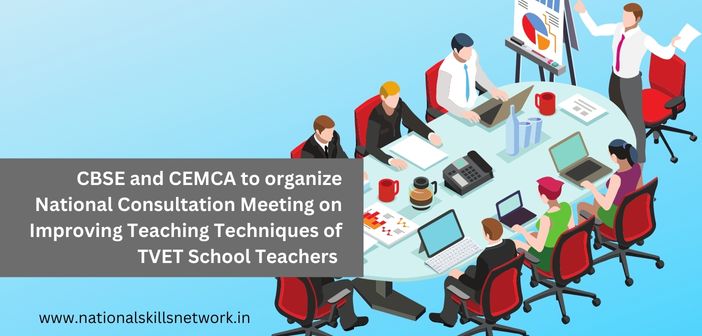Commonwealth Educational Media Centre for Asia (CEMCA) and the Central Board of Secondary Education (CBSE) are organizing a National Consultation Meeting for the course development of “Improving Teaching Techniques of TVET School Teachers” on December 19 and 20, 2022, in New Delhi.
The national consultative meeting is focused on engaging in a conversation with vocational school educators to understand the key challenges and their requirements in the delivery of vocational courses and programs and contribute to the preparation of a skilled workforce as per industry demand.
The main objective is to create an online self-learning program for vocational educators to upskill them with the necessary skills to enhance teaching techniques for vocational courses and programs. While outlining the contents of the course on ‘Improving Pedagogy,’ the secondary objective of the meeting is for vocational educators to grasp the necessity for upskilling and the role they play in the development of vocational education in the country.
Expected outcome from the meeting:
- To outline the challenges that exist in the delivery of vocational courses and programs at school.
- To identify possible sustainable approaches to address the aforementioned challenges by sharing best practices.
- To identify skills that shall assist TVETs in consistently upskilling them in the delivery of vocational courses.
- To develop a structure and detailed course modules for “Improving Teaching Techniques of TVET Teachers.”
- To find a sustainable challenge in the delivery of the online program with available resources.

To know more about the schedule of the National Consultation Meeting, please visit – https://nationalskillsnetwork.in/wp-content/uploads/2022/12/CBSE-and-CEMCA-to-organize-National-Consultation-Meeting-on-Improving-Teaching-Techniques-of-TVET-School-Teachers.pdf
India has a very young population, with 25.9% of the population under the age of 14, only 8.1% over the age of 60, and up to 66% in the working age range of 15–59 in 2018. As a result, there is a pressing need for quality education, jobs, training, and support for entrepreneurship. But according to the findings of the Periodic Labour Force Survey [PLFS], as of 2020, only 2.74% of Indians who are working-age are formally trained in TVET.
Also read: Highlights from the consultative meeting for validation of training curriculum for vocational educators of Indian Universities https://nationalskillsnetwork.in/highlights-from-the-consultative-meeting-for-validation-of-training-curriculum-for-vocational-educators-of-indian-universities/
These findings demonstrate how the country has adjusted to the rising need for a skilled workforce as a key source of economic growth. Driving the interest of the nation’s working-age population in skill-oriented domains must be emphasised during the formal education years. The Central Board of School Education (CBSE) 2018 redesigned its curriculum to include vocational subjects as mandatory subjects under the NSQF (National Skills Qualifications Framework), leading to the appointment of a large number of vocational educators in schools.













